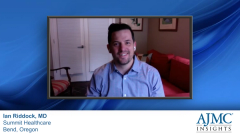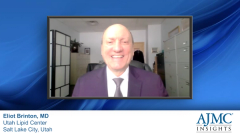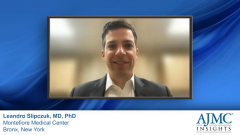
What Does a Multidisciplinary Team Look Like?
Drs Brinton and Slipczuk go into detail regarding an ideal multidisciplinary team for ASCVD treatment.
Episodes in this series

Eliot Brinton, MD: The question is should there be a team effort to help in this process? The answer is yes. Doctors can do a lot, but doctors work better when we work with mid levels. Physician extenders is a term that has been used when we also work with nurses, when we work with patient educators. There are so many people within our own office who can help teach the patient, can help interface with a pharmacy or payer. A team effort is the best way to go. Then let's not neglect the pharmacist. Pharmacists play a key role whenever we're talking about medication therapy. If we can communicate with the pharmacist and they can communicate with us, it works much better than if we never see each other or try to avoid each other. Every member of the health care team can play an important role. Certainly, the interface with the payers. Oftentimes, systems will have patient advocates that work for the payer, but their job is to advocate for the patient. That is extremely helpful. We have some innovative pharmacies that are helping us with prior authorizations or with maybe special cash pricing or bridge supplies of medication while we're doing the prior authorization procedure. There are some very important team members that maybe we don't think of so often who are essential. The bottom line is that we as doctors shouldn't do the whole thing ourselves, we need to involve and engage others, or we're simply less efficient.
We know that patients, after an index event, have a percentage of about 6% to have another event in the first year and about 9% or 10% to have PCI [percutaneous coronary intervention]. That's a huge number. And in particular, if that happens without being in the right therapy, that's a failure in the system. We're taking different approaches to this. We've been gathering information, first on the situation in our network and ways of improvement. We established the lipid clinic, and we made every physician aware that this was a possibility and that they could send the patients for just 1 or 2 visits, just to make sure that they were fully optimized when they were at high risk. And now, we're going a step forward, and we're working on setting up a kind of patient navigator, a person focused on identifying these patients in our network. In that way, we are planning on tracking these patients at the high risk of ASCVD [atherosclerotic cardiovascular disease] and making sure they're in the right therapies, they understand their diet, too–because it's not about just medications–that they are on the optimal diet, that they know when to come to the hospital, that they know how to take their medications. I'm very hopeful that we'll reach even more patients.
Leandro N. Slipczuk, MD, PhD: To have a successful multidisciplinary team, everyone has to understand the importance of what we're doing. Having a motivated team where everyone understands the value of their work and everyone's values for the work makes a big difference. Part of it is in education in the group, that everyone that's working understands their role and how to do that part properly. It's essential that we don't have a physician alone doing this. There's a lot of value from pharmacists in this, also. They can explain the worries that patients may have about adverse effects, about medication interactions, and having a pharmacist closely working with this, is essential. And that made a huge difference. We're lucky enough to have some of the highest people in our pharmacy very involved on this process, and they see the value, and they've supported our movement into bringing this clinic to work and to bringing these patients to goal. But also, the nurse and the nurse practitioners I've had, in my prior institution, a dedicated nurse for this, and I have one here as well. And the nurses are usually the first contact with the patient. Also having a nurse that can answer questions and can build up our relationship with the patient will make a big difference in compliance and then the patient understanding of their condition. Each person in the team is essential in order to reach the goal.
This transcript has been edited for clarity.
Newsletter
Stay ahead of policy, cost, and value—subscribe to AJMC for expert insights at the intersection of clinical care and health economics.











